Here it is: I have suffered from post-partum depression twice. There. It's out there now. Up until now, I had told only a few close friends and a couple of family members. Now the world can know.
First, I would like to say that I have recovered. PPD leaves its scars and it brings all kinds of things to the surface, and I have learned that I have to deal with them, but the depression is gone. So why bother talking about it now? There are a number of reasons, but my first is that I no longer want to be part of the conspiracy of silence around this disease. And I hope that my readers know (or will by the end of this entry) that PPD is truly a disease like any other; it just happens to affect the mind (and the soul) instead of the body.
My storyWithin days of Maïa's birth, I believe I started to suffer from PPD. At the time, I thought it was the "baby blues" I was told to look out for: tears at anything, general malaise, and a feeling of being overwhelmed. But the babies blues are supposed to go away within a few days. My feelings of sadness and ineptitude persisted for months. Some days I would cry and cry. What had I got myself into? How could I take care of this baby? Everything that she did or didn't do (like cry or fail to breastfeed correctly) was my fault. I had failed as a mother and as a person. And to make matters worse, this was supposed to be the happiest time in my life: I had a beautiful newborn daughter. So why did I feel so terrible?
What I was worried about is completely inconsequential: there are thousands and millions of moms who go through far worse things in the first months of motherhood and never become depressed. It is not about the situation. It's about predisposition.
I was exhausted and depressed. How depressed? I was actually contemplating - planning, really - to leave. I had a plan mapped out in my mind. I was going to pack a bag, leave when Derek was just about to come home (so as not to leave Maïa alone more than a few minutes), and hop on a bus and just go. I didn't know where I was going, but what was important was that I was going to go. I figured they would both be better off without me. Obviously, I never got to that point, but I understand those who leave (including those who commit suicide).
I went completely undiagnosed. I was afraid. Afraid to be called crazy. Afraid that people would think less of me if I was depressed. Afraid that I was admitting that I really had failed somehow. Afraid that... I'm not sure. I don't know that I ever really put it into words. Derek practically begged me to call the support group, but I refused. I was strong enough to get through it. Truth is, I wasn't. And that's ok. But I didn't realise that at the time. So Derek, my mom, and some friends with babies Maïa's age pulled me through, just by being there. Derek carried me in a way I can't even begin to describe.
I recovered from that first bout of PPD. How, I'm not entirely sure. Part of it had to do with me going back to work when she was about 8 months old. Part of it was due to the fact that I was starting to get more sleep. Part of it had to do with time. None of it had anything to do with what I did or willed to have happen.
When I got pregnant with Solanne, there were two things I vowed to do: get professional help with breastfeeding if it wasn't working and get professional help if I started feeling the PPD returning.
For the first two months of Solanne's life, I was floating on a cloud. I was so happy. Every night, when we went to bed, I would turn to Derek and say, "I'm just so happy." And I really was. Our family was complete; we had two very healthy little girls; Solanne was feeding well and gaining beautifully. I was tired, but I was happy.
Then just two days before Christmas, my mom had her accident. I believe that was my trigger. It was an emotionally trying time. It was also very time-consuming for me: I had to take care of my mom's financial affairs, pack up her house and sell it, look for an apartment for her, and take care of countless other details, besides looking after my toddler and little baby. It was rough. And one day, I found myself crying and crying, inconsolably. Then I knew it was back. And Derek saw it, and he told me that I had to call the support group. But the next day, I was ok. And I was ok for about a week. And then it happened again. And again I was ok the next day. But my sad days began to come closer and closer together. And I started feeling overwhelmed. At my worst, I couldn't even
contemplate going out to the store (a block from our home) to pick up milk. There was no way that I could get out the door with the two of them. The anxiety was palpable.
I also had some serious anger issues. I might even call it rage. If Solanne didn't sleep at least half an hour at a time (which was rare, even when she was only a few months old), I would become furious. I knew she would be cranky because she hadn't slept enough, and I really needed some time with Maïa and some time to myself, too. There were times that I flew into a rage - in another room, away from the kids. My anger felt out of control. I knew I would never hurt the kids, but it still scared me.
So I called a support group called
M.O.M.S. I started attending the support group that very week. There, I found all the resources I needed.
Some things you might not know about PPDPost-partum depression, also known as post-partum mood disorder or ppd and anxiety, affects between 15 and 20 percent of new moms, including adoptive mothers. The symptoms are many: deep sadness, guilt (a big one), anxiety, panic attacks, obsessive-compulsive behaviour, intrusive thoughts, feelings of failure and ineptitude, isolation, and many more.
PPD must not be confused with post-partum psychosis, which is an illness that causes a small number of women to hallucinate and hear voices. In some rare cases, women harm themselves and/or their children. THIS IS NOT PPD. And PPD cannot suddenly
become post-partum psychosis. PPP manifests itself within days of the child's birth; if correctly diagnosed and treated, the mother can make a full recovery.
PPD can occur up to one year after the birth of the child (and in rare cases, a little later).
PPD can last weeks or months, and in some cases, years.
PPD is a real disease, and it is treatable.
Those who have a personal of family history of depression are more likely to develop PPD.
Lack of a support system (or the perception thereof) can be a contributing factor to the development or persistence of PPD.
Although there are no definite causes of PPD, major life changes or occurrences can trigger the onset of PPD.
My recoveryMy recovery began the moment I sought help. That was literally my biggest hurdle, given that I am terrible at asking for help and admitting that I need it. The group leader at M.O.M.S. strongly suggested that I see my doctor immediately, and she told me about the
Ottawa Community Care Access Centre. I asked my doctor for a referral to the OCCAC; I got a call from them within an hour of returning home from the appointment.
Within days, I was assigned a respite care-giver who came to our home three mornings per week. Her name was Amanda, and she was a soft-spoken young woman who became part of our family. Her role was to give me time to myself so that I could do what I needed to get better. For the most part, that meant sleep. So sleep I did for those three hours on Monday, Wednesday, and Friday mornings. The sleep and the time away from my girls gave me the energy I needed to enjoy them again, at least more than I was enjoying them. But the anxiety was still high.
I had a counselor from the VON visit me once a week. Heather was so wise and so kind, and she helped me see so many things about myself, things I had hidden from everyone, even myself. We dug up a lot of things, she and I. Some beautiful, some frightful. And I am still sorting through the artifacts. And I will continue to sort through them for years to come, I think.
I also attended a support group that met once a week on Wednesday evenings. There, I met a single mom with a 9-year-old, a 7-year-old, and newborn; an older new mom whose baby had some serious health concerns; a teenage mom who was going through serious issues with her partner; a new mom whose baby was picture-perfect and slept through the night at two months of age. We all had different stories, but our experiences were surprisingly similar. We all felt sad. We all felt anxiety. Mostly, we all felt guilt. I learned that guilt is the biggest and most difficult of the symptoms to overcome.
I learned that recovery is a roller-coaster. At first, there are nothing but bad days. Then there are good days here and there. But the bad days coming off the good days are a horrible crash and feel devastating. Soon, however, the good days come closer and closer together. And the bad days are fewer and fewer, yet still unbelievably scary. Scary because it feels like you're in a free-fall into the deep hole all over again. And because you feel like you're going to have to do all the work all over again to get to where you were. In reality, there is less work to get back up there, but it's hard to see from the vantage point of down. To this day, if I have a bad day (the washer breaks down and Solanne gets an ear infection in the same day, for example), I feel uncommonly anxious. I think, Here we go again. I'm getting depressed again. I know, of course, that that isn't the case. But the feeling is there.
I attended the support group from March to June, and then we moved to Montreal. Over the summer, things got considerably better. Mostly, I had Derek around, and parenting à deux is so much easier. Solanne started to sleep more. Things were looking up. But there was a day in October when everything seemed to be going wrong, and I had to call Derek. I told him that I couldn't do it. He had to come home. And he did. It turns out that it was an aberration on the radar, but it felt like my world was falling apart again. I was still fragile - am still fragile. But I'm a tough cookie, and luckily I can be reasonable about it now.
DerekWhen Derek and I started getting serious, I warned him that I had suffered from depression before and that although I am a generally happy person, it was likely that I would suffer from it again. He looked at me and told me that he would be with me through everything, including depression.
He has kept his word and has given me more support than I could ever have imagined. He was the one who pushed me to get help. He read the pamphlets, the websites, the books. He did everything he possibly could to help out: he skipped classes on my really bad days so he could be home to take care of the kids; he cleaned the house and cooked meals; he took on Solanne's night wakings (the non-hunger induced ones) and let me sleep peacefully and uninterrupted on the couch; he took on many of the responsibilities of my mom's affairs; he left home late in the morning and returned early in the afternoon, even when that meant that he would have to pull some all-nighters to catch up. (And despite all this, Derek finished his thesis on time and with major accolades and top marks.)
Derek has carried me through these two very difficult periods in my life. There are so many images of romantic love out there, about flowers and diamonds and poetry, but to me, the most romantic thing I have ever received is the support of my husband through those very trying times.
One last wordAs part of my mission to get the word out about PPD, I would appreciate it if you, as my reader, would post in the comments section any experience you may have had with PPD. You may sign in as "anonymous" if you like. But I think it would be helpful for those who have experienced PPD themselves or whose wives or mothers have, or those who have suffered depression first-hand or otherwise, might write a word or two about it. Just get it out there. It's time that we end the cycle of shame and begin to speak honestly about this disease.
Thanks for reading. And thanks for commenting.
Cristina




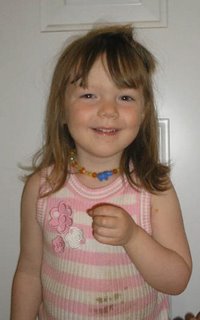
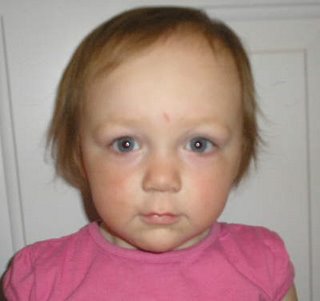
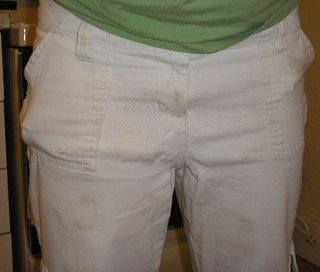
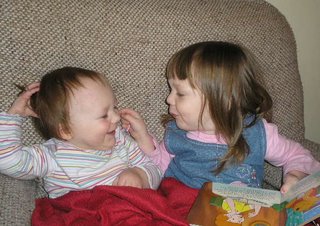
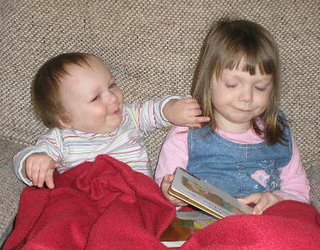


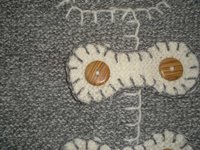
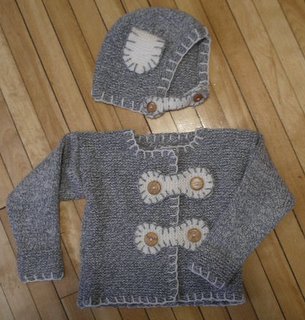
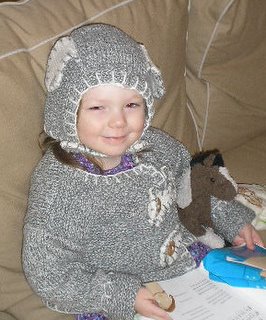
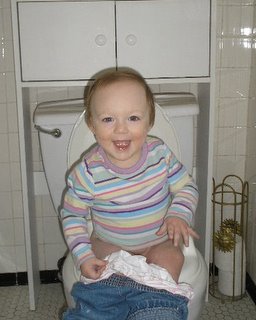
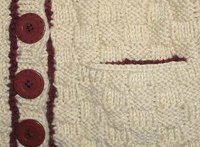
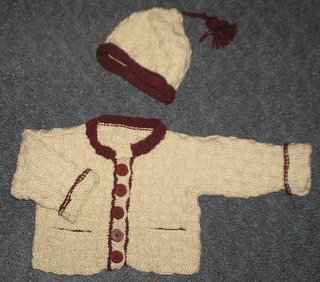
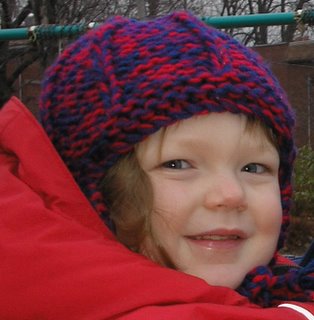
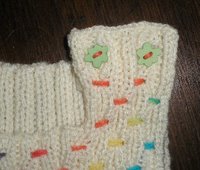
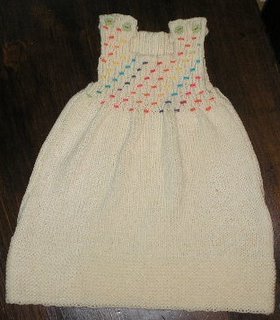


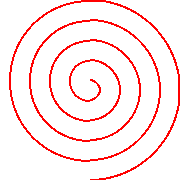
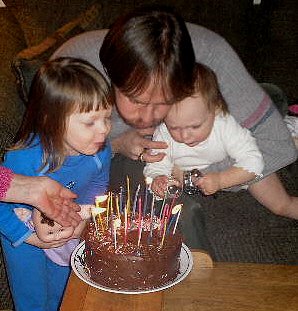
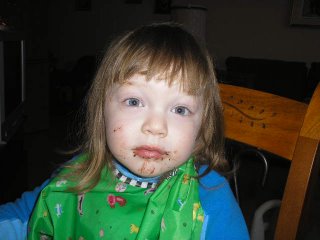




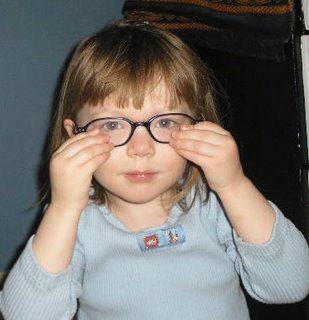
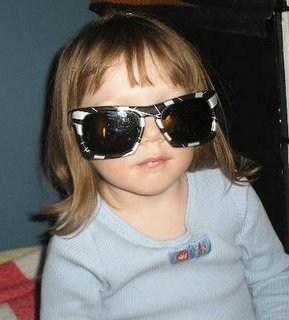
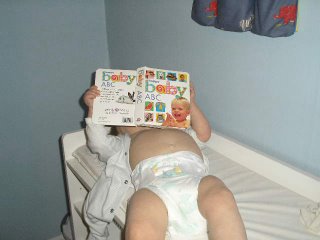
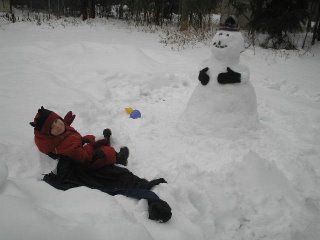 Maïa and her snowman, Ned.
Maïa and her snowman, Ned. Eating snow.
Eating snow.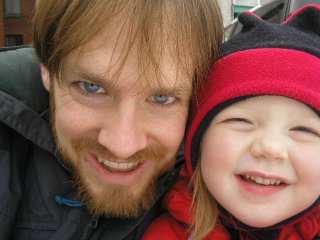 Posing.
Posing.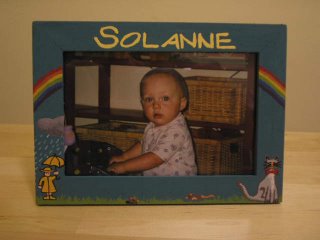 Nick and I painted the frame for this picture we gave to Gramma.
Nick and I painted the frame for this picture we gave to Gramma.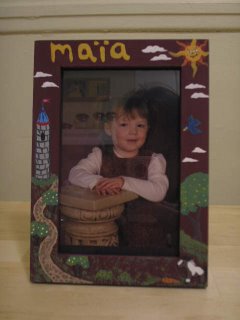 Derek and Naomi painted this one.
Derek and Naomi painted this one. We got Maïa to work on Christmas cards.
We got Maïa to work on Christmas cards. Even Solanne wanted to be included, so she drew (on) herself.
Even Solanne wanted to be included, so she drew (on) herself.


